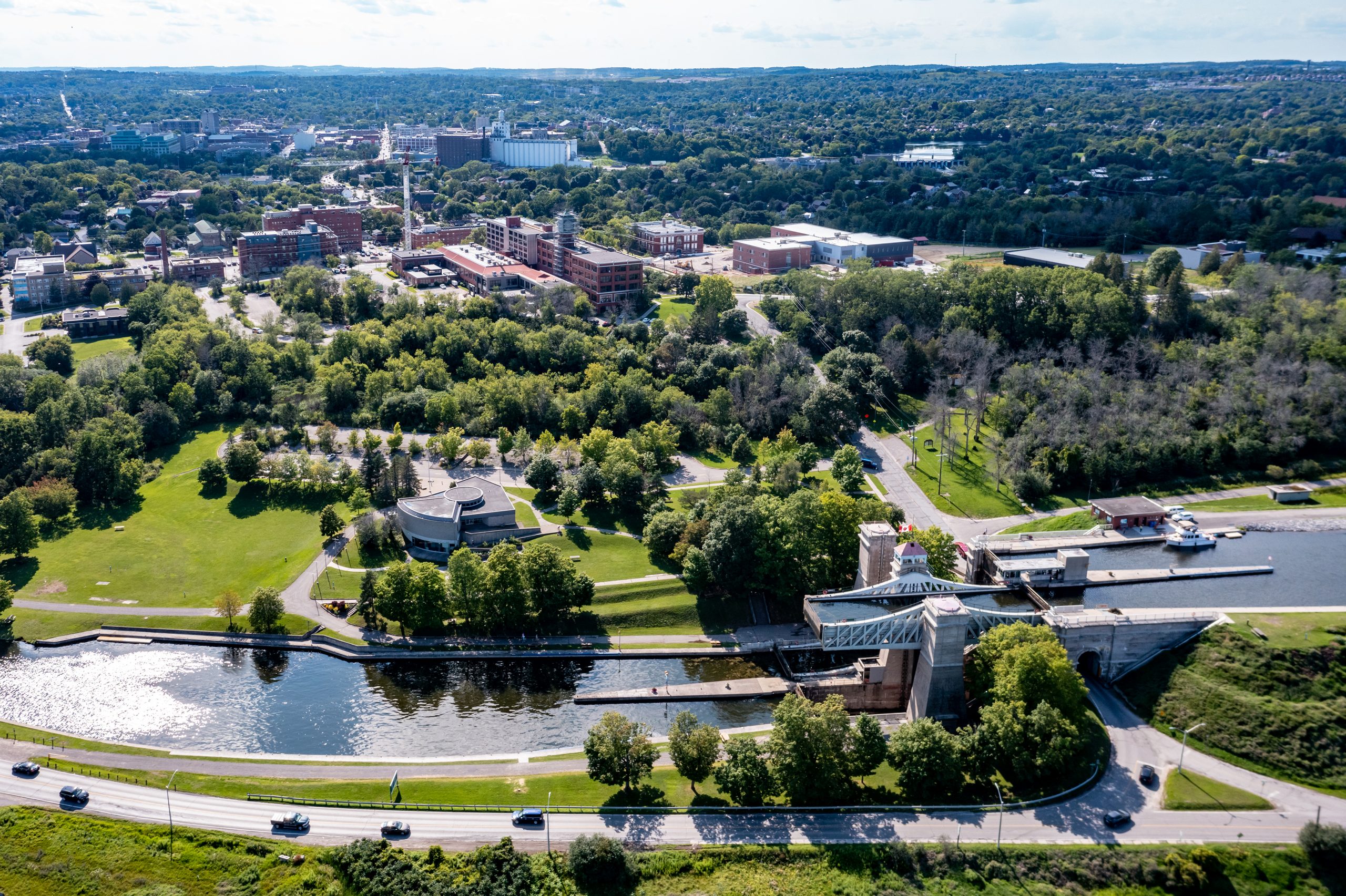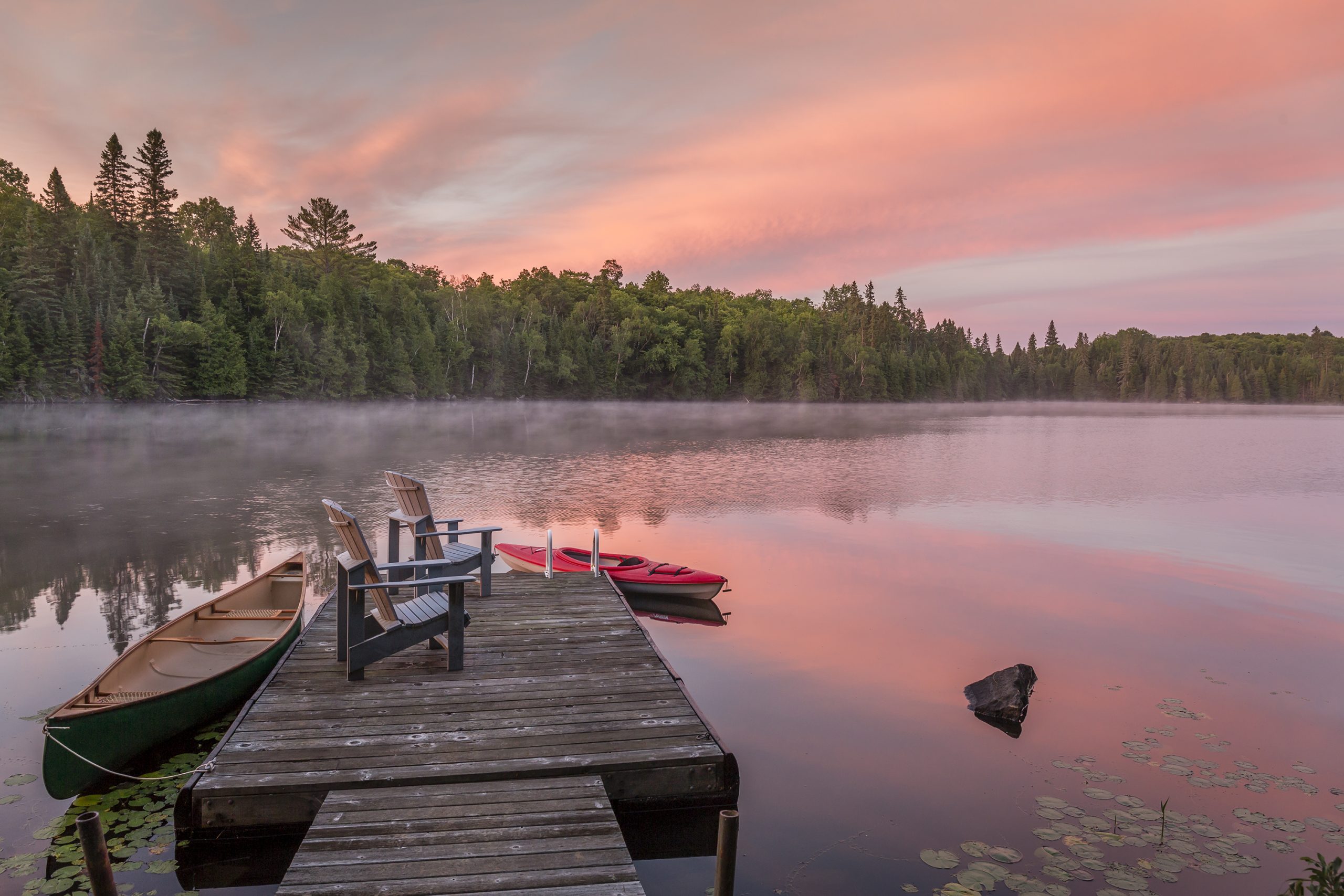Peterborough, Ontario Summer Bucket List: 15 Must-Do Activities

Looking for the ultimate way to spend your summer in Peterborough and the Kawarthas? Whether you’re a local or visiting for the first time, this list is your go-to guide for making the most of sunny days, warm nights, and everything in between. From scenic hikes to free concerts, there’s something here for everyone.
Here are 15 must-do activities to add to your summer bucket list in Peterborough, Ontario:
1. Cruise the Peterborough Lift Lock
Take a boat tour or paddle your way through the Peterborough Lift Lock, one of the highest hydraulic boat lifts in the world. It’s part of the Trent–Severn Waterway and offers a unique experience—watch the water rise beneath you as you’re gently lifted 65 feet into the air! It’s a relaxing and educational way to explore Peterborough’s rich canal history.
2. Visit the Canadian Canoe Museum
This world-class museum recently reopened at a new waterfront location and tells the story of Canada’s canoeing heritage. Featuring over 600 watercraft and engaging exhibits, the Canadian Canoe Museum is a must-see for history buffs, families, and anyone who enjoys time on the water.
3. Hike the Warsaw Caves
Located about 30 minutes from the city, Warsaw Caves Conservation Area is an outdoor lover’s paradise. Wander through scenic trails, explore limestone caves, and paddle along the Indian River. Pack a picnic, wear sturdy shoes, and bring a flashlight—it’s a day of adventure that feels like a true escape.
4. Spend a Day at Riverview Park & Zoo
Peterborough’s free zoo is a favourite for families, featuring animals from around the world, a fun mini-train ride, splash pad, and beautiful parkland. It’s a relaxed place to spend a summer day with kids—or to just enjoy a peaceful walk.
5. Discover Petroglyphs Provincial Park
A sacred Indigenous site, Petroglyphs Provincial Park is home to the largest known concentration of ancient rock carvings in Canada. It’s also a great spot for hiking and learning about Indigenous culture and spirituality. The quiet forest setting adds to the sense of reverence and wonder.
6. Paddle from Beavermead Park
Beavermead Park offers easy access to Little Lake, making it a perfect launching spot for kayaks, canoes, or paddleboards. Rentals are available on-site in summer months, often through the Canadian Canoe Museum or other local operators. Don’t forget your swimsuit—the beach is ideal for a cool dip afterward!
7. Attend Peterborough Musicfest
This beloved summer tradition runs twice weekly through July and August, offering free outdoor concerts at Del Crary Park on Little Lake. Past performers have included Serena Ryder, Sam Roberts Band, and Tegan and Sara. Bring a lawn chair or blanket and enjoy the sunset with great music.
8. Explore Downtown Markets and Festivals
Peterborough’s downtown comes alive in the summer with farmers’ markets, food festivals, and artisan pop-ups. The Peterborough Regional Farmers’ Market (Wednesdays and Saturdays) is perfect for fresh produce, flowers, baked goods, and local crafts. Don’t miss Taste of Downtown or Ribfest for foodie fun.
9. Visit Local Museums and Galleries
Get your culture fix with a visit to the Peterborough Museum & Archives, Hutchison House Museum, or the Art Gallery of Peterborough. Whether you’re interested in local history, Scottish tea services, or contemporary Canadian art, these spaces offer cool air and rich stories on a hot summer day.
10. Hike or Bike the Rotary Greenway Trail
This multi-use trail follows the Otonabee River and connects downtown Peterborough to Trent University and beyond. It’s ideal for walking, running, or cycling with river views and shaded paths. Pack a lunch and stop at one of the many scenic picnic spots along the way.
11. Spend the Afternoon at Beavermead Park
In addition to being a paddling hub, Beavermead is a go-to destination for a classic summer day: swimming, sunbathing, playing volleyball, letting kids loose on the playground, or enjoying an ice cream under the shade trees. There’s even a disc golf course nearby for a little friendly competition.
12. Take a Day Trip to Lang Pioneer Village or Canada’s Dinosaur Park
Looking for a fun day trip? Lang Pioneer Village Museum offers a glimpse into 19th-century life with costumed interpreters, heritage buildings, and hands-on activities. For families, Dinosaur Park just north of the city is full of life-size dinosaurs, splash zones, and dino-themed fun for little ones.
13. Catch Outdoor Arts & Festivals
From movie nights in Quaker Square to the Peterborough Folk Festival, there’s always something happening outdoors in the summer. Watch live theatre, join a drum circle, or enjoy impromptu art installations. Check local listings for weekend events—you’ll often find hidden gems!
14. Grab a Local Ice Cream or Treat
Cool down with a cone from Kawartha Dairy, a Peterborough staple with dozens of classic and creative flavours. Or sit down for a treat at Silver Bean Café, perched right on the waterfront and perfect for people-watching and enjoying a latte by the lake.
15. Stargaze or Chill by the Fire
End your perfect summer day with stargazing or a lakeside bonfire. Bring a telescope or just your eyes—Peterborough has great visibility for meteor showers like the Perseids in August. Or, head to a nearby cottage or campsite and make some memories around the campfire (don’t forget the s’mores!).
Your Peterborough Summer Starts Now 🌞
From outdoor adventures to cultural experiences, Peterborough is full of summer magic waiting to be discovered. Whether you’re planning your weekends or entertaining guests from out of town, this bucket list will help you make the most of every sunny moment.
Making the Most of Summer with Kids (Without Burning Out)

Summer with kids can be magical — the sun, the splash pads, the spontaneous ice cream runs — but let’s be honest: it can also be exhausting. With routines out the window, endless snacks, and the pressure to “make memories,” it’s easy for parents to feel overwhelmed. But summer doesn’t have to be all or nothing. With a little planning (and a lot of grace), you can soak up the season and preserve your sanity.
Here are some simple ways to make the most of summer with your kids — without burning out.
1. Lower the Bar (Seriously)
Not every day needs to be a Pinterest-perfect adventure. Kids will remember the feel of the grass under their feet, late bedtimes, and popsicles on the porch just as fondly as a pricey trip to the zoo. Give yourself permission to not be the cruise director 24/7.
2. Build a Flexible Routine
You don’t need a strict schedule, but a general rhythm can help keep everyone grounded. Try something like:
-
Morning: Screen-free play, park, or a craft
-
Afternoon: Quiet time (yes, even older kids can benefit!)
-
Evening: Family walk, backyard play, or a movie
Knowing what to expect helps kids feel secure—and gives you mental breathing room.
3. Plan a Few “Big” Days
Pick 3–4 outings over the whole summer and put them on the calendar. Think beach day, amusement park, or a visit to Grandma’s. Spread them out and let the anticipation build. This makes summer feel full without filling every single day.
4. Create an “I’m Bored” Basket
Fill a basket with simple activities: bubbles, chalk, scavenger hunt cards, sticker books, activity sheets, or building challenges. When the “I’m bored!” chorus starts up, send them to the basket. Bonus: it reduces your mental load.
5. Say Yes to Help
Camp, a morning with grandparents, or a babysitting trade with a friend can go a long way. You don’t have to do it all yourself. Even one solo coffee run a week can be a game-changer.
6. Find Your Moments, Too
Don’t forget about your summer. Whether it’s reading a book in the backyard, having a glass of wine on the deck, or waking up early for a quiet walk — make space for joy that’s just for you. Happy parents = happier kids.
7. Let Go of Guilt
Some days will be perfect. Some days will be chaos. You might cry in the bathroom. You might yell. It’s okay. You’re doing your best, and your kids don’t need perfect — they just need you, present and human.
Final Thoughts
Summer with kids doesn’t need to be high-effort to be high-impact. Focus on connection, keep things simple, and build in time for yourself. Your kids will remember how it felt — not how many places you went or how often the craft supplies came out.
So take a breath, embrace the chaos, and enjoy the sweet, sticky, sun-soaked moments. You’ve got this.
Discovering Waterfront Parks: Peterborough & Beyond

1. Beavermead Park, Peterborough
Nestled on the southeast shore of Little Lake, Beavermead Park spans over 50 acres of diverse recreational spaces—trails, playgrounds, a sandy beach, volleyball courts, outdoor fitness equipment, soccer fields, and a pavilion. It’s also home to Beavermead Campground, where kayaks and canoes can be rented via Otonabee Conservation. Outdoor enthusiasts enjoy paddling on calm waters, using shelters for picnics, and playing sports throughout summer.
2. Del Crary Park, Peterborough
On Little Lake’s west shore, just a short walk from downtown, Del Crary Park is famed for its marina, stage, picnic tables, and green spaces. The iconic Peterborough Musicfest—a free summer concert series—draws roughly 110,000 attendees annually and brings $4.3 million into the region. The park hosts fireworks, dragon boat celebrations, Canada Day festivities, and more. Do note: dogs are restricted May–Oct (except service animals).
3. Jackson’s Creek Park, Peterborough
Tucked along Jackson Creek, this tranquil green space offers winding trails, bird-watching opportunities, and scenic picnic spots revered by locals. Budget-friendly dates and conversations suggest it’s “a nice spot if you don’t want to travel far” (reddit.com). The creek has played a defining role in Peterborough’s growth, with trails now being enhanced through the Jackson Creek Diversion project.
4. Millennium Park, Peterborough
Millennium Park sits along the Otonabee River and is a perfect complement to Little Lake’s waterfront attractions. It features a boathouse café, art installations, and connects the Trans Canada Trail to downtown. Relax by the river, enjoy seasonal canoe and kayak rentals, and meander through the butterfly garden and sculptures.
5. Lakefield Beach & Waterfront, 13 km North
A serene escape awaits at Lakefield Beach (65 Hague Boulevard), just a short Rotary Trail ride from Peterborough. The locals are investing in accessibility—launch upgrades and assistive equipment since mid-2024 . This welcoming spot offers swimming, boating, and a lakefront playground—with beach pavilion rentals available.
6. Lindsay Waterfront & Scugog River
Venturing to Lindsay, you’ll find waterfront treasures like:
-
Logie Park: paddle sport dock, lookout, splash pad nearby
-
Rivera Park: boat launch, playground, picnic spots and trails lining the Scugog River
-
Paddling experiences: from historic downtown to wetlands, via routes like Lindsay Memorial Park → Lock 33 or woodland-to-wetland journeys
7. Kawartha Lakes: Hidden and Accessible Gems
Further afield in the region, discover:
-
Squirrel Creek Conservation Area: beach, creek-side picnicking, and baseball diamonds (otonabeeconservation.com)
-
Sandy Lake & Quarry Bay Beaches: peaceful, sandy family-friendly shores (thekawarthas.ca)
-
Buckhorn / Northey’s Bay: charming stops along the Trent–Severn Waterway, ideal for boating and scenic vistas
🌞 Tips & Tricks for Your Park Adventures
-
Bring a paddle – canoe/kayak rentals are available at Beavermead, Millennium, Del Crary, Lindsay, and Lakefield.
-
Plan for events – Musicfest, dragon boat races, fireworks, and festivals enliven the waterfront seasonally.
-
Pack essentials – sunscreen, snacks, water shoes, insect repellent—and bring bags for your waste.
-
Accessibility matters – Lakefield upgrades in progress; Lindsay’s parks and splash pads include barrier-free features
-
Explore by bike or paddle – trails like Rotary Trail, Trans Canada Trail, and Rotary Trail to Lakefield are popular, with picturesque stops along waterways (reddit.com).
Your Waterfront Itinerary
| Day | Morning | Afternoon | Evening |
|---|---|---|---|
| 1 | Beavermead Park swim/play | Paddle to Millennium Park, café stop | Picnic at Del Crary + Musicfest |
| 2 | Bike the Rotary Trail to Lakefield | Swim/launch at Lakefield Beach | Catch the sunset on the trail or dock |
| 3 | Head to Lindsay: paddle from Logie Park | Explore Riviera/town trails | Dinner downtown, then relax by the river |
From Peterborough’s bustling Little Lake hubs to Lakefield’s accessible charm, Lindsay’s paddling routes, and Kawartha Lakes’ hidden gems, there’s a perfect waterfront spot for every mood—be it an active day out, a romantic picnic, or a family festival outing. With summer in full swing, lace up your shoes, fill your water bottle, and set out to explore the region’s vibrant waterside treasures!
Real Estate Market Analysis for June 2025

The June 2025 numbers are in, and they paint an interesting picture of a shifting market in Peterborough. While prices have dipped slightly year-over-year, buyer activity is on the rise, and that could mean new opportunities for both buyers and sellers.
More Sales, More Listings—But Slightly Lower Prices
One of the biggest takeaways this month is the increase in market activity. There were 108 residential sales in June 2025, up from 86 in June 2024—a jump of 25.6%. That’s a clear sign that buyers are feeling more confident and are ready to make moves.
At the same time, inventory has grown. There were 345 active listings this June, compared to just 258 at the same time last year—a 33.7% increase. This surge in available homes is likely giving buyers more options and contributing to more balanced market conditions.
Despite the increase in activity, average prices have dipped slightly, down 3.0% year-over-year. The average sale price in June 2025 was $632,169, compared to $642,317 in June 2024. This softening could be attributed to the higher supply or more entry-level properties selling. Either way, it may present a window of opportunity for buyers.
Homes are also continuing to move relatively quickly, with the average number of days on market sitting at 20.
What This Means for Buyers
If you’ve been waiting for the right time to buy, this could be it. With more inventory on the market and prices slightly lower than last year, there’s a bit more breathing room than we’ve seen in previous months. That said, homes are still selling fast, so having your financing in place and being ready to act quickly is key.
What This Means for Sellers
While prices have softened slightly, the increased number of sales and low days on market show that there’s still strong demand, especially for homes that are priced well and marketed properly. With more competition on the market, working with an experienced agent to make your home stand out is more important than ever.
Final Thoughts
The Peterborough real estate market is active and evolving. With more homes available and more buyers making moves, the summer season is heating up. Whether you’re thinking about buying, selling, or just watching the market, it’s a great time to reach out and talk about your next steps.
Have questions about the Peterborough market or what these numbers mean for your plans?
We always have an agent on duty to help. Call our office at 705-743-4444 and we will be happy to direct you to a REALTOR® to answer your questions.
*All data from CLAR/TRREB 2025 & InfoSparks®© 2024 MLS® Resale Residential. Information deemed reliable but is not guaranteed.
Highlighted below are some of the major areas we cover with our stats:
How to Host the Perfect Canada Day BBQ

Canada Day is the perfect excuse to gather your favourite people, fire up the grill, and celebrate summer in true Canadian style. Whether you’re hosting a backyard bash or a relaxed family get-together, a few thoughtful touches can take your BBQ from basic to brilliant. Here’s how to host the ultimate Canada Day BBQ that your guests will remember long after the fireworks fade.
1. Plan Your Guest List and Layout
Start with a headcount so you can plan food, seating, and drink quantities. Set up zones in your yard or patio—one for grilling, one for eating, and one for relaxing or playing games. Add some shade with umbrellas or a pop-up tent if the forecast calls for sun.
2. Deck Out in Red and White
Lean into the theme with red-and-white decor, Canadian flags, and fun touches like maple leaf bunting or themed tableware. Mason jars with red flowers or mini Canadian flags make great centrepieces. Don’t forget a patriotic playlist—think The Tragically Hip, Shania Twain, and Neil Young!
3. Craft a Crowd-Pleasing Menu
Keep it simple but satisfying. Classic BBQ fare like burgers, hot dogs, sausages, and grilled veggies are always a hit. For a true Canadian twist, consider:
-
Maple-glazed salmon or chicken
-
Poutine bar with toppings
-
Butter tarts or Nanaimo bars for dessert
-
Caesar cocktails or local craft beer
Set up a self-serve drink station with coolers or a canoe filled with ice and beverages.
4. Keep the Kids Happy
If you’re expecting younger guests, add some kid-friendly activities like bubble wands, sidewalk chalk, water balloons, or a sprinkler. Red-and-white Canada Day temporary tattoos or mini flags also make fun giveaways.
5. Make It Entertaining
Lawn games like cornhole, ladder toss, or giant Jenga encourage guests to mingle. In the evening, bring out sparklers and blankets so everyone can enjoy the fireworks in comfort.
6. Prep Smart and Grill Like a Pro
Do as much food prep as possible the day before. Marinate meats, chop veggies, and set up your serving table. On the big day, stay close to the grill and cook in batches so food is hot and fresh throughout the afternoon.
7. Safety First
Keep a fire extinguisher handy, make sure your grill is clean and positioned safely away from your house, and always keep an eye on the kids near open flames or hot surfaces.
Final Tip: Keep It Chill
You don’t need to go overboard. Canada Day is all about connection and community, so focus on the people, not perfection. With a few festive touches and good food, your BBQ will be a hit no matter what.
Top Outdoor Projects to Tackle to Get Your Outdoor Space Ready for Summer

Summer in Peterborough and the Kawarthas is something truly special. With our beautiful lakes, rolling countryside, and long sunny days, it’s no wonder so many of us look forward to spending as much time outside as possible. Whether you’re relaxing at home, entertaining friends and family, or listing your home for sale, a well-designed outdoor space adds serious value and enjoyment.
If your backyard, patio, or deck is looking a little worse for wear—or just needs a seasonal refresh—here are the top outdoor projects to tackle this year to get your space summer-ready.
1. Refresh Your Patio or Deck
After a long Ontario winter, your patio or deck probably needs some attention. Start with a good pressure wash to remove built-up grime, then reseal any wood surfaces to protect them from the summer sun and rain. If you don’t yet have a dedicated outdoor living space, installing a deck or stone patio is a great investment—both for your lifestyle and your property value.
Local Tip: Cedar and composite decking hold up well in our climate and require less maintenance than traditional pressure-treated wood.
2. Create Zones for Lounging, Dining, and Entertaining
Think of your yard as an extension of your home—each “room” should have a purpose. Whether you have a small city lot in Peterborough or a sprawling cottage property in the Kawarthas, dividing your outdoor space into distinct areas for relaxing, cooking, and playing helps it feel organized and intentional.
Add a cozy seating area around a fire pit, a dining table under a pergola, and a few lounge chairs in a sunny spot for maximum usability.
3. Upgrade Your Outdoor Furniture
Comfortable, durable furniture makes all the difference. Opt for weather-resistant pieces made from teak, resin wicker, or powder-coated metal. Add cushions in summer-friendly fabrics like Sunbrella for extra comfort and easy maintenance.
If you’re short on space, try a bistro table set or folding loungers that can be tucked away when not in use.
4. Incorporate Shade Solutions
The sun can be intense in July and August, especially during peak afternoon hours. Adding shade is not only practical but makes your space much more inviting.
Options include:
-
Retractable awnings
-
Pergolas with climbing vines
-
Shade sails
-
Large patio umbrellas
These features help keep you cool while protecting furniture from UV damage.
5. Add Outdoor Lighting for Evening Enjoyment
Once the sun goes down, good lighting allows the fun to continue. Soft, ambient lighting adds atmosphere, while pathway and deck lights improve safety.
Some popular lighting options include:
-
String lights over a patio or fence line
-
Solar garden stakes along walkways
-
Spotlights on trees or garden beds
-
Lanterns or LED candles for tabletops
Pro tip: A mix of lighting styles keeps things functional and cozy.
6. Install a Fire Pit or Outdoor Fireplace
Nothing says summer nights like sitting around a crackling fire. Portable propane fire tables, classic wood-burning fire pits, or even a full outdoor fireplace can turn your yard into a gathering place from May through October.
Remember to follow local bylaws in Peterborough or your specific township when it comes to open fires and distance requirements.
7. Beautify Your Landscaping
A little landscaping goes a long way. Clean up overgrown shrubs, edge your lawn, and add colourful perennials or annuals for a seasonal boost. In the Kawarthas, native plants like coneflowers, black-eyed Susans, and bee balm attract pollinators and thrive in local soil.
Raised garden beds are another great addition—ideal for growing herbs, veggies, or cut flowers. They’re low-maintenance and perfect for beginners.
8. Add Water Features for a Spa-Like Vibe
Even a small fountain or bubbling rock can add a sense of calm to your backyard. If you live near a lake or river, consider building a dock or creating a natural shoreline garden that blends seamlessly with the environment.
For city lots, solar fountains or ceramic birdbaths are low-effort, high-reward projects.
9. Build Privacy Into Your Design
A little privacy makes your outdoor space feel like a retreat. Options to consider include:
-
Lattice screens with climbing plants
-
Tall planters with ornamental grasses
-
Fast-growing hedges like cedar or dogwood
-
Fencing upgrades or additions
This is especially useful if your yard backs onto other homes or a busy road.
10. Organize Your Storage and Tools
No one wants to trip over toys or dig for gardening tools. Set up a tidy storage shed or deck box to house outdoor gear, sports equipment, and cushions. Install wall hooks or shelves in your garage to keep things off the floor and out of the way.
A clean, clutter-free yard always feels more inviting—and it’s easier to maintain.
Bonus: Set the Mood with Decor and Personal Touches
Outdoor rugs, throw pillows, planters, and art can bring your space to life. Choose colours and textures that complement your home’s style, and don’t forget to mix in some local flair—maybe a handmade sign from the Lakefield Farmers’ Market or Muskoka chairs in your favourite cottage-country colour.
Your Ultimate Guide to a Stress-Free Cottage Weekend

There’s nothing quite like escaping to the cottage for a weekend of fresh air, quiet mornings, and evening bonfires. But between packing, planning, and getting out the door, even a simple weekend getaway can come with its fair share of stress. The good news? With a bit of prep, your next cottage escape can be all about peace, not pressure.
Here’s your ultimate guide to a stress-free cottage weekend.
1. Start with a Simple Packing List
Avoid the chaos of overpacking or forgetting the essentials by making a checklist. Keep it short and organized by category:
-
Clothing: Think layers—hoodies, bathing suits, a rain jacket, and comfy loungewear.
-
Toiletries: Bring the basics, plus bug spray and sunscreen.
-
Food & Drink: Plan simple meals (bonus if you prep ahead), and don’t forget snacks and coffee!
-
Entertainment: Books, cards, Bluetooth speaker, maybe a board game or two.
Pro tip: Keep a laminated list in your weekend bag to reuse every time you go.
2. Prep Food Before You Go
You’re not heading to the cottage to spend hours in the kitchen. Do some light meal prep before you leave—marinate meats, chop veggies, or make a pasta salad. Prepping a few grab-and-go breakfasts like muffins or overnight oats can make your mornings easier too.
3. Leave Work at Home
Set an out-of-office reply. Mute notifications. Let your contacts know you’ll be off the grid. A true cottage weekend should feel like a break from the daily grind—not just a change of scenery. If you’re tempted to check emails, consider leaving your laptop behind altogether.
4. Time Your Drive Smartly
Nothing kills the vibe like sitting in traffic. If you can, leave on Thursday evening or early Friday to beat the rush. Make sure your car is gassed up, your directions are saved (especially if cell service is spotty), and your playlist is queued.
5. Make Room for Doing Nothing
It can be tempting to pack your weekend full of hikes, boat rides, and BBQs. But don’t forget to leave time for doing absolutely nothing. Sip your coffee on the dock. Take a nap in a hammock. Watch the sunset. The best memories are often the slow, simple moments.
6. Bring the Right Company
Whether it’s your partner, your kids, or your closest friends, the people you share your weekend with make all the difference. Choose company that’s low-drama, up for a laugh, and comfortable with a little unplugged time.
7. Unplug to Recharge
Cottages and tech don’t always mix—thankfully. Use the spotty Wi-Fi as a cue to disconnect. No social media scrolls, no doom-scrolling news, just fresh air, good conversation, and maybe a starry sky.
A stress-free cottage weekend doesn’t have to mean total off-the-grid living—it just takes a little planning and a willingness to slow down. Pack light, prep ahead, and embrace the ease of cottage life. Whether you’re roasting marshmallows by the fire or enjoying a quiet paddle across the lake, the goal is simple: unwind, recharge, and come home feeling better than when you left.
Transform Your Patio: Easy & Stylish DIY Outdoor Furniture Ideas

Is your patio looking a little… uninspired? Before you break the bank on pre-made outdoor furniture, consider the satisfying and often budget-friendly world of DIY! Creating your own patio pieces not only adds a unique, personalized touch to your outdoor space but also gives you the pride of knowing you built it yourself.
Whether you’re a seasoned DIYer or just starting out, there’s a project for everyone. Here are some fantastic DIY outdoor furniture ideas to get your creative juices flowing and transform your patio into an inviting oasis.
1. Pallet Perfection: Versatile & Trendy
Wooden pallets are a DIY dream! They’re often free or very inexpensive, readily available, and incredibly versatile. With a bit of sanding, sealing, and imagination, you can create:
- Lounge Seating: Stack pallets to create a base for a comfy outdoor sofa or sectional. Add outdoor cushions and throw pillows for a luxurious feel.
- Coffee Tables: A single pallet on casters makes for a rustic and movable coffee table. You can even add a glass top for a smoother surface.
- Vertical Herb Gardens/Planters: Stand pallets upright and add shelves to create a beautiful and functional vertical garden.
Pro Tip: Always check pallets for any chemical treatments (look for “HT” for heat-treated, which is generally safer) and give them a good cleaning and sanding before use.
2. Crate & Barrel (Not the Store, the Concept!): Simple & Chic
Wooden crates, whether new or salvaged, offer a charming and adaptable base for various furniture pieces.
- Side Tables: Stack two or three crates on their sides to create an open and airy side table. The open compartments are perfect for storing books, blankets, or even extra drinks.
- Storage Benches: Line up several crates, secure them together, and add a padded top for a clever storage bench that’s perfect for stashing outdoor essentials.
3. Concrete Blocks & Wood: Modern Industrial Flair
For a sturdy, modern, and surprisingly simple solution, combine concrete blocks with lumber.
- Sofa Bases: Stack concrete blocks in a desired configuration, then lay thick pieces of lumber (like 4x4s or 6x6s) across them to create a robust base for cushions. This look is very “architectural” and cool.
- Planter Benches: Create a bench with concrete blocks and lumber, incorporating open sections in the blocks to act as built-in planters for succulents or herbs.
4. Spool Savvy: Repurpose Cable Spools
Large wooden cable spools (often found at construction sites or utility companies) are fantastic for creating unique, circular pieces.
- Outdoor Dining Tables: With a good cleaning, sanding, and a fresh coat of paint or stain, a large cable spool makes a fantastic, rustic outdoor dining table.
- Side Tables/Ottomans: Smaller spools can be transformed into quirky side tables or, with added padding, unique ottomans.
5. Upcycled Tire Seating: Fun & Functional
Give old tires a new lease on life! While they might not be the first thing you think of for furniture, tires can be transformed into surprisingly comfortable and durable seating.
- Ottomans/Stools: Cover a tire with rope, fabric, or even spray paint, then add a padded top for a fun and robust ottoman or stool.
- Planters: While not furniture, tires also make excellent, durable planters for a pop of greenery.
Before You Start Your DIY Project:
- Measure Your Space: Know the dimensions of your patio to ensure your furniture fits comfortably.
- Consider Durability: Choose materials that can withstand outdoor elements (sun, rain, snow). Treat wood with outdoor-grade sealants or paints.
- Comfort is Key: Don’t forget cushions and pillows! These can make even the simplest DIY piece incredibly comfortable.
- Safety First: Always use appropriate safety gear (gloves, eye protection) and follow proper tool safety guidelines.
- Get Inspired: Browse Pinterest, Instagram, and other DIY blogs for endless ideas and tutorials.
So, roll up your sleeves and get ready to create! With a little effort and creativity, you can craft beautiful, functional, and personalized outdoor furniture that will make your patio the envy of the neighbourhood. Happy building!
Real Estate Market Analysis for May 2025

The latest real estate data for May 2025 is in, and it reveals a market that continues to adjust to evolving economic conditions. While activity has remained relatively steady, both home prices and sales have seen a modest dip compared to this time last year. Here’s a breakdown of what the numbers are telling us.
Market Snapshot – May 2025 vs. May 2024
-
Average Sale Price: $639,394 (down 4.2% from $667,111 in May 2024)
-
Number of Sales: 109 homes sold (down 4.4% from 114)
-
Active Listings: 315 (up from 254 – a 24% increase)
-
Average Days on Market: 24
What Does This Mean for Buyers?
Buyers may find some relief in the current market compared to the competitive conditions we’ve seen in recent years. The combination of a slightly lower average sale price and a growing number of active listings means more options and more negotiating power. With homes sitting on the market for an average of 24 days, there’s also a bit more breathing room to make informed decisions without rushing into multiple offer situations.
What Does This Mean for Sellers?
While the average sale price has dipped slightly year-over-year, the Peterborough market is still performing within a healthy range. Sellers may need to adjust their pricing strategies and expectations, particularly with inventory levels on the rise. That said, well-presented and correctly priced homes are still moving within a reasonable timeframe. Professional marketing, staging, and pricing your home competitively will remain key to attracting buyers.
A Market in Balance?
The increase in active listings paired with only a modest decline in sales volume suggests that Peterborough is edging toward more balanced market conditions. This can create a healthier environment for both buyers and sellers, reducing the extreme highs and lows we’ve seen over the past few years.
Looking Ahead
As we move into the summer months, it will be interesting to see if buyer activity increases with the warmer weather or if affordability concerns continue to temper demand. For now, the market remains stable with a slight lean toward favouring buyers — but opportunities still exist on both sides of the transaction.
Have questions about the Peterborough market or what these numbers mean for your plans?
We always have an agent on duty to help. Call our office at 705-743-4444 and we will be happy to direct you to a REALTOR® to answer your questions.
*All data from CLAR/TRREB 2025 & InfoSparks®© 2024 MLS® Resale Residential. Information deemed reliable but is not guaranteed.
Highlighted below are some of the major areas we cover with our stats:











 Facebook
Facebook
 X
X
 Pinterest
Pinterest
 Copy Link
Copy Link













